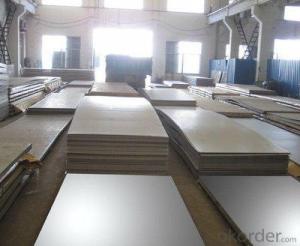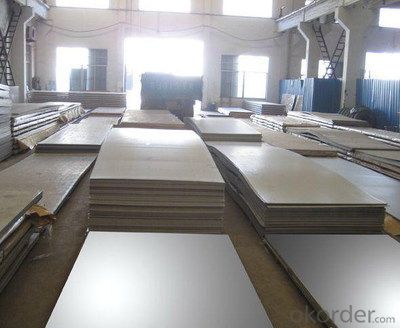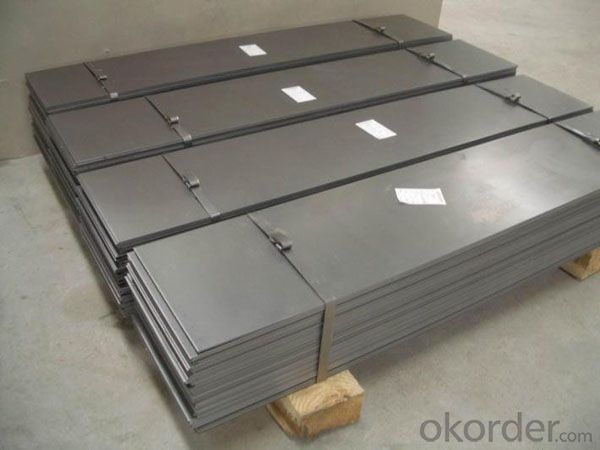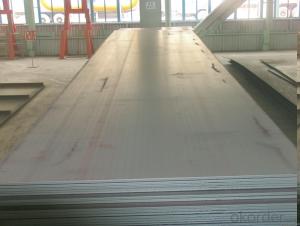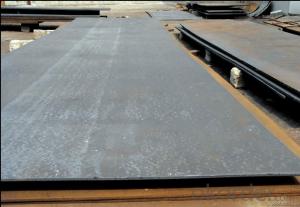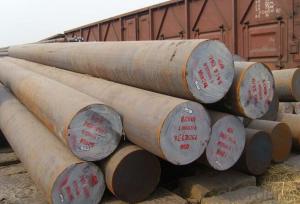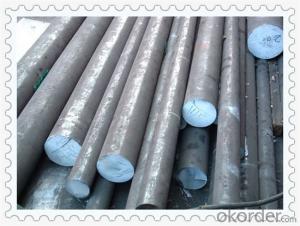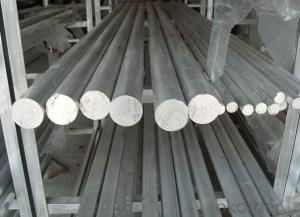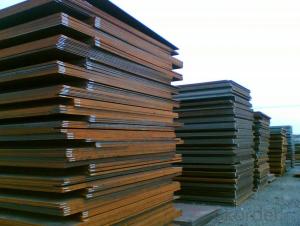Special Steel 30CrMnSi Alloy Steel Plate
- Loading Port:
- China main port
- Payment Terms:
- TT OR LC
- Min Order Qty:
- 30 m.t.
- Supply Capability:
- 10000 m.t./month
OKorder Service Pledge
OKorder Financial Service
You Might Also Like
Specification
Special Steel 30CrMnSi Alloy Steel Plate
Product Information:
1)Grade : 30CrMnSi
2) Thickness : 2mm-600mm
3) Width : 1500mm-2400mm
4) Length : 4000mm-11000mm
5) MOQ : 10MT
6) Origin : China
Product Overviews:
| Product Name | Typical Grades | Diameter(mm) | Standard adopted |
| Carbon Steel | 20 (1020/S20C/C22) | Ø16-Ø300 | GB/SAE/JIS/DIN |
| 40 (1040/S40C/C40) | |||
| 45 (1045/S45C/C45) | |||
| Bearing Steel | GCr9 (51100/SUJ1) | Ø12-Ø250 | |
| GCr15 (52100/SUJ2/100Gr6) | |||
| GCr9SiMn (A485-Gr.1/SUJ3) | |||
| Cr-Mo Steel | 20Cr (5120/SCr420H/20Cr4) | Ø12-Ø250 | |
| 40Cr (5140/SCr440/41Cr4) | |||
| 42CrMo(4140/SCM440/42CrMo4) | |||
| Gear Steel | 20CrNiMo | Ø16-Ø600 | |
| 20CrMn(5115/SMnC420/20MnCr5) | |||
| 20CrNiMo(8620/SNCM220/20CrMiMo2) |
Product Show:

Our Advantages:
· Industry experience over 20 years.
· Shipment of goods -More than 70 countries worldwide.
· The most convenient transport and prompt delivery.
· Competitive price with best service.
· High technical production line with top quality products.
· High reputation based on best quality products.
With our experienced, enthusiastic and dynamic staffs, we assure to bring you the products with best quality, reasonable prices and good after-sales services under the motto: Friends First, Business After.
Communication, Experience, Expertise and Best efforts are our Promises to you.
- Q: What are the main applications of special steel in the marine sector?
- Special steel is widely used in the marine sector for various applications. Some of the main applications include the construction of ship hulls, offshore platforms, and marine structures. Special steel's high strength, corrosion resistance, and durability make it suitable for withstanding harsh marine environments. Additionally, special steel is used in propeller shafts, rudders, and other critical components, ensuring efficient and reliable performance of marine vessels.
- Q: What are the different heat treatment processes for special steel?
- Some of the different heat treatment processes for special steel include annealing, quenching and tempering, hardening, case hardening, and precipitation hardening.
- Q: What are the main characteristics of electrical steel?
- The main characteristics of electrical steel include high magnetic permeability, low electrical resistivity, and low hysteresis loss. It is specifically designed to efficiently conduct and transform electrical energy, making it ideal for use in transformers, motors, and generators.
- Q: How does special steel perform in low-temperature applications?
- Special steel performs well in low-temperature applications due to its unique properties such as high strength, toughness, and resistance to brittleness. It retains its mechanical properties even at extremely cold temperatures, making it ideal for industries like aerospace, automotive, and energy where materials need to withstand challenging environments.
- Q: Can special steel be used in the production of gearboxes?
- Yes, special steel can be used in the production of gearboxes. Special steel, such as alloy steel or tool steel, offers higher strength, durability, and wear resistance, making it suitable for use in gearboxes that require heavy-duty performance and efficient power transmission.
- Q: How is stainless steel used in the food and beverage industry?
- Stainless steel is widely used in the food and beverage industry due to its unique properties. It is corrosion-resistant, easy to clean, and does not impart any taste or odor to the food or beverage being prepared or stored. Stainless steel is used in various applications such as food processing equipment, storage tanks, utensils, and even in the construction of kitchen appliances. Its hygienic nature and durability make it an ideal choice for maintaining food safety standards and ensuring the quality of products in the industry.
- Q: What are the different methods for electroplating special steel?
- To electroplate special steel, various methods can be employed based on specific requirements and desired outcomes. The following are some commonly utilized techniques: 1. Electroless Nickel Plating: Achieving uniform and corrosion-resistant coatings on special steel is possible through this method, which entails depositing a layer of nickel onto the steel surface using a chemical reaction. 2. Zinc Plating: A protective layer is provided to special steel through the immersion of the steel in a zinc solution and the passage of an electric current, facilitating the deposition of zinc onto the surface. 3. Copper Plating: Enhancing conductivity and corrosion resistance of special steel can be achieved by immersing the steel in a copper sulfate solution and applying an electric current to deposit a layer of copper onto the surface. 4. Chromium Plating: This method is commonly employed to confer a decorative, corrosion-resistant, and hard-wearing surface on special steel. It involves immersing the steel in a chromium bath, and an electric current is applied to deposit a layer of chromium onto the surface. 5. Electroplating with Precious Metals: For decorative or functional purposes, special steel can be electroplated with precious metals like gold, silver, or platinum. These coatings enhance the appearance, conductivity, or corrosion resistance of the steel. 6. Electroplating with Alloy Coatings: Special steel can be electroplated with alloy coatings, such as tin-zinc or tin-lead, for specific applications that require unique properties like enhanced solderability or improved wear resistance. It is important to consider factors such as desired properties, intended application, and specific requirements of the special steel being plated when selecting an electroplating method. Each method has its advantages and limitations, making it advisable to consult experts in the field to determine the most suitable technique for electroplating special steel in a given scenario.
- Q: Can special steel be used for making electronics components?
- Yes, special steel can be used for making electronics components. Special steel refers to a type of steel that has been designed and manufactured to possess specific properties and characteristics that make it suitable for various applications, including electronics. In electronics manufacturing, special steel can be utilized for creating components such as connectors, springs, contacts, and other parts that require high strength, durability, and resistance to corrosion and wear. These properties are essential for ensuring the reliable performance and longevity of electronic devices. Additionally, special steel can also offer excellent thermal conductivity, electromagnetic shielding, and magnetic properties, which are crucial in certain electronic applications. For instance, in the production of transformers, special steel laminations are used to minimize energy loss and improve efficiency. Furthermore, special steel can be tailored to meet the specific requirements of different electronic components. For example, certain grades of stainless steel can be used for making components that need to withstand harsh environmental conditions or come into contact with corrosive substances. Overall, the use of special steel in electronics manufacturing provides an effective solution for producing components that can meet the demanding performance standards of modern electronic devices.
- Q: What are the challenges in recycling special steel?
- Recycling special steel poses several challenges due to its unique composition and properties. Firstly, special steel is often alloyed with various elements to enhance its strength, durability, and corrosion resistance. These alloys can make the recycling process more difficult and complex compared to recycling common steel. One of the main challenges is the separation of special steel from other metals during the recycling process. Special steel may contain rare and valuable elements such as nickel, chromium, and molybdenum, which are essential for its unique properties. Separating these elements from other metals requires advanced techniques and specialized equipment, increasing the complexity and cost of recycling. Another challenge is the presence of impurities in special steel. These impurities can be introduced during the manufacturing process or through contamination during use. Removing these impurities is crucial to ensure the recycled steel meets the required specifications for its intended applications. However, the high melting point and resistance to purification of some impurities may complicate the recycling process. Furthermore, the physical characteristics of special steel, such as its high hardness and toughness, can make it challenging to handle and process during recycling. Special steel often requires more energy-intensive methods, such as shredding or melting at higher temperatures, which can increase the overall cost and environmental impact of the recycling process. Moreover, the economic viability of recycling special steel can be a challenge. The market demand for special steel may fluctuate, making it difficult for recyclers to ensure a consistent and profitable supply. Additionally, the costs associated with the collection, transportation, sorting, and processing of special steel can be higher compared to common steel, further impacting the economic feasibility of recycling. In conclusion, the challenges in recycling special steel primarily stem from its complex composition, the need for separation from other metals, the presence of impurities, the physical characteristics of the material, and the economic viability of the recycling process. Addressing these challenges requires innovative technologies, efficient separation methods, and a sustainable market demand for recycled special steel.
- Q: How does special steel perform in terms of machinability?
- Special steel typically has good machinability due to its composition and specific manufacturing processes. It is often designed to have improved cutting and chip formation properties, allowing for easier and more efficient machining operations. This allows manufacturers to achieve high precision and productivity when working with special steel, making it a favorable choice for various applications.
Send your message to us
Special Steel 30CrMnSi Alloy Steel Plate
- Loading Port:
- China main port
- Payment Terms:
- TT OR LC
- Min Order Qty:
- 30 m.t.
- Supply Capability:
- 10000 m.t./month
OKorder Service Pledge
OKorder Financial Service
Similar products
Hot products
Hot Searches
Related keywords
